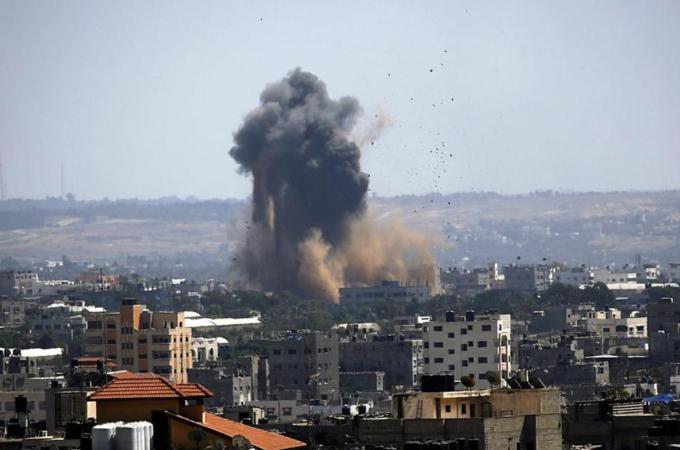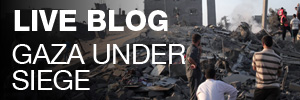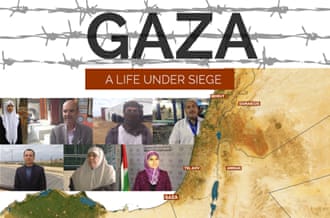How the Israeli government is misleading the world one press conference at a time.
By Marwan Bishara

Israel's media strategy aims to mystify, mislead and even misrepresent the reality, writes Bishara [EPA]
|
| Do you wonder why there are many questions left unanswered regarding the Israeli escalation in Gaza? Why the questions are so meek, the responses so murky, the phrases come in cliches and soundbites you've heard before? Do you feel watching certain interviews is an assault on your intelligence? Do you wonder why official Israeli spokespersons sound so calm, smiley and kind when their popular base sounds so angry, so aggressive, and so racist? How they are likely to say something like, "thank you it's nice to be with you", even after being grilled by a probing frustrated anchor. Why, when asked about the expansion of illegal settlements, Israeli spokespersons speak of the need for a peace settlement, and when asked about bombing civilians, they speak of a better future for all children, Israeli and Palestinian?
Wonder no more. This is all part of a well-thought, well-orchestrated media strategy to mystify, mislead and even misrepresent the reality. And much of it can be found in The Israel Project's 2009 Global Language Dictionary.
But this is not unique to Israel. Governments set up entire ministries and/or institutions to defend their policies and advance their narrative, at times to mislead their enemies or competitors. Indeed, it's naive to expect otherwise. Like cynicism, gullibility is especially dangerous for journalists.
Don't say that, say this
Five years ago, US-based "The Israel Project" asked a Zionist Republican pollster, Frank Luntz, to prepare a new updated media guide for "leaders who are on the front lines of fighting the media war for Israel". The project builds on some of the best examples of Israeli leaders' own success at mystification, in order to devise a strategy that neutralises Israel's critics and promotes and improves its media standing.
It's a step-by-step guide that underlines "the words that work" and the "words that don't work" when speaking to westerners. Like any marketing or PR campaign, much of the suggested code words, phrases and sound bites are based on polls.
The report came after Israel's 2008 Gaza war and following US President Barack Obama's denouncement of Israeli settlements and his overtures towards Iran. It was prepared for internal use only and kept secret, until it was finally leaked in the fall of 2009.
So for example, how to sell Americans on the Israeli settlements: "Be positive. Turn the issue away from settlements and toward peace. Invoke ethnic cleansing."
And how to gain the support of viewers: The pro-Israel pundits are instructed to be careful with their tone.
"A patronising, parental tone will turn Americans and Europeans off" because it's at a time in history when Jews in general - and Israelis in particular - are "no longer perceived as the persecuted people".
Among sophisticated, educated, opinionated American and European audiences, "Israelis are often seen as the occupiers and the aggressors. With that kind of baggage, it is critical that messages from the pro-Israel spokespeople not come across as supercilious or condescending."
And since the US evangelical base already supports Israel, the Dictionary warns against using religious arguments when speaking to western leftists or liberals. But since to "much of the Left", both sides are equally at fault, and because the Israelis are more powerful, the most effective way to build support for Israel is to talk about "working toward a lasting peace" that "respects the rights of everyone in the region".
And why is it so important to always speak of peace? The report signals two reasons: One: If Americans see no hope for peace - if they only see a continuation of a 2,000-year-long episode of "Family Feud" - Americans will not want their government to spend tax dollars or their president's clout on helping Israel. Reason two: "The speaker that is perceived as being most for peace will win the debate."
And this is one of my favourite attempts at deception:
"Americans agree that Israel has a right to defensible borders. But it does you no good to define exactly what those borders should be. Avoid talking about borders in terms of pre- or post-1967, because it only serves to remind Americans of Israel's military history. Particularly on the left, this does you harm."
Gaza sequel
Chapter six of the 18-chapter, 117-page guide focuses on the lessons from the last Gaza war and proposes a more effective public diplomacy for the next time around, i.e. this round.
One of the first recommendations goes as follows:
"Israel made painful sacrifices and took a risk to give peace a chance. They voluntarily removed over 9,000 settlers from Gaza and parts of the West Bank, abandoning homes, schools, businesses, and places of worship in the hopes of renewing the peace process."
And "Despite making an overture for peace by withdrawing from Gaza, Israel continues to face terrorist attacks, including rocket attacks and drive-by shootings of innocent Israelis. Israel knows that for a lasting peace, they must be free from terrorism and live with defensible borders."
Needless to say, much of the formulation is misleading. Most of the illegal settlers had already moved out because of mounting Palestinian resistance, pushing Israel to finally redeploy its military without any coordination with the Palestinian Authority. The decision was motivated by the need to disengage demographically from 1.5 million impoverished Palestinians and was based on cost-benefit analysis, not peace strategy. All of which partially explains why Israel has being laying siege to Gaza and reckons it has the right to intervene militarily at will ever since.
At any rate, the guide suggests that defenders and promoters of Israel's war need to use the kind of language that "may be hard for some of you to say, but every result of research confirms that an approach like this is the best way for an Israeli spokesperson to truly be heard and therefore make a difference".
Consider these choice tidbits: "Israel should not be bombing Gaza. I will repeat that. Israel should not be forced into a situation where they have to bomb Gaza. Likewise, Hamas should not be deliberately firing rockets into civilian areas of Israel. If the rockets stop, we can achieve that peace where Palestinian and Israeli children live in safety."
"When it comes time to talk about rockets, the best word is 'deliberate'. Don't say that Hamas is 'randomly rocketing Israel'. Do say 'Hamas is deliberately firing rockets into Israeli towns, communities, and civilian populations'."
"Paint a vivid picture of what life is like for Israeli civilians and children under the constant threat of rocket attack. You have to humanise why Gaza happened and what Israel has faced for weeks, months, even years."
Five-step guide to winning hearts
The guide advises the pro-Israel camps to "use rhetorical questions to gain permission from the audience for Israel's actions".
For example: "What should Israel do? Imagine, if thousands of rockets were fired into your community every day and every night? What would your country do? What would you want them to do? Don't we have a duty to protect our citizens?"
And here comes the worst bit of deception:
"Americans recognise that rocket attacks are an impediment to peace; but they do not accept rockets as an excuse to abandon peace. It is utterly expected that Israeli spokespersons will talk about proportionality and prevention of rocket attacks. But if you take the unexpected approach of talking about another 'p' word - the most important 'p' word to the public - you generate immense credibility."
So here's the five-step approach to talking about civilian casualties in Gaza:
The guide concludes this chapter on the worst possible advice: "Israel should not give any more land for peace, because every time it does, it just gets more war."
|




No comments:
Post a Comment